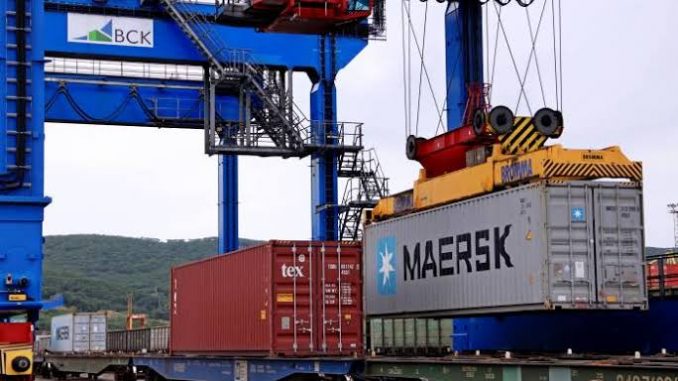
The Danish shipping giant, Maersk, is setting at pace its Asia-Northern Europe ocean-rail service, it previously offered on a monthly basis in west-bound direction only.
Now, it said the service will now be provided fortnightly both export from Asia to Europe and return from Europe to Asia to increase the pace of goods movement.
Maersk said this is expected to help many customers who are currently facing difficulties with their import/export logistics, due to Covid-19.
The Danish carrier had recently announced that its combined Ocean and Rail service, AE19, will be offered on a regular basis for both directions through close co-operation with Pantos Logistics.
ALSO READ: Maersk appoints Lara Lana as first female, Nigerian country manager
The entire journey, starting from Busan to Vostochny in a vessel, followed by Vostochny to St. Petersburg by rail, takes a mere 16 days.
“In this way, AE19 can offer highly competitive transit times for customers,” commented Maersk.
Maersk said that following a successful pilot launch of the West-bound service last August, the recent launch of the bi-directional service has also been highly successful.
Transit times from South Korea and Japan to Northern Europe have been reduced to 23-32 days from the previously 52-57 days through intermodal transportation.
“Frequent cancellations and congestion in ports and airports around the world due to Covid-19 have made the usual ocean and air services less attractive for customers. Evidently, AE19’s volumes have increased by approximately 30% compared to pre-Covid-19, compensating for the reduced demand for our other services,” Jason Park, head of Maersk Korea, stated.
With this development, Maersk is aiming to attract more customers with the transition to a fortnightly service.
“AE19 gains its competitiveness by offering lower rates than air, while still ensuring a faster transit time compared to ocean for their high-value, large-volume cargoes,” Maersk said.
The Copenhagen-based company added that because the rail service only operates within Russia, customers can also avoid border congestion that is typically associated with intercontinental transportation within the route and expect a more seamless service overall.
“AE19 service attracts many customers by allowing them to manage transportation risk, providing cost competitiveness and connecting various origins and destinations,” Key client manager, Sung Don Yang said.
Through close co-operation with Russian Railways and Modul LLC as Rail transport providers of AE19, Maersk is using the Trans-Siberian Railway (TSR) for its dangerous cargo transportation.
Maersk plans to further increase volumes by targeting customer segments dealing with high-value and/or lead-time-sensitive cargoes.




